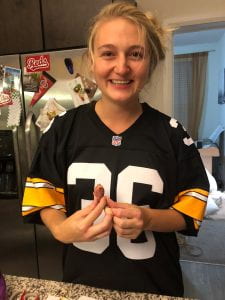On the interview trail, one question seems to come up in every interview—the wording might be different but the information they are trying to collect is the same. How do you handle negative feedback? How do you approach a team member that is not pulling their weight? What would you do if a fellow resident showed up to work drunk? It all boils down to the same thing: how do you treat others?
I think the programs are trying to gather what I call the tone of my character. What tone do I set in these circumstances? What made me adapt that particular tone?
Here’s a glimpse at my answer: My parents come from humble beginnings, dad a farmer, mom the eldest of 4 siblings in a single income home. They fought for themselves, for us, for a better life. They moved across the country, worked many odd jobs, and now, they have provided an excellent life for me and my sister. Because of how they grew up though, they instilled a few lessons in me.
- You are not better than anyone else. You may come from a bigger house and have a car, but you are a human being, and so is the homeless person on the street. Treat them with respect.
- Work hard. Hard work pays off. (They are a prime example of this one)
- Follow through. “You made a commitment. You will honor that.”
Through this answer, I hope my interviewers can gather that I offer respect to everyone I interact with and therefore, demand respect from those around me. I even had one interviewer ask, “Well, doesn’t respect have to be earned?” My response, “I think respect should be a given, unless betrayed and thus lost on one another.” I hope they gather that I treat everyone equally regardless of our differences. I hope they understand that I will finish what I start and give my best effort always. Below is a screenshot of positive evaluations from my sub-internship this year. It seems that my hard work Is paying off.
In last year’s portfolio assignment, I started a list of vow’s that I plan to honor, my own sort of Hippocratic oath. The three promises I began with are listed below, followed by a few more I’ve added since then.
- I will not tolerate discrimination of any kind from anyone, and I will speak up against it.
- I will also not tolerate intimidation for intimidations sake, especially in the OR. I think it cultivates a poor learning environment.
- I will buy snacks for my team at least once a month- again, cultivating a good team environment.
- I will dedicate my time to teaching the next generation of doctors.
- I will work on improving myself as a person and a surgeon for as long as I shall live.
- I will remember to incorporate perspective into my life, to focus on the bigger picture.
- I will help those struggling with compassion and understanding rather than judgement and punishment.
- I will ask for help before I am drowning.
- I will continue to add to this list as I grow and learn.







